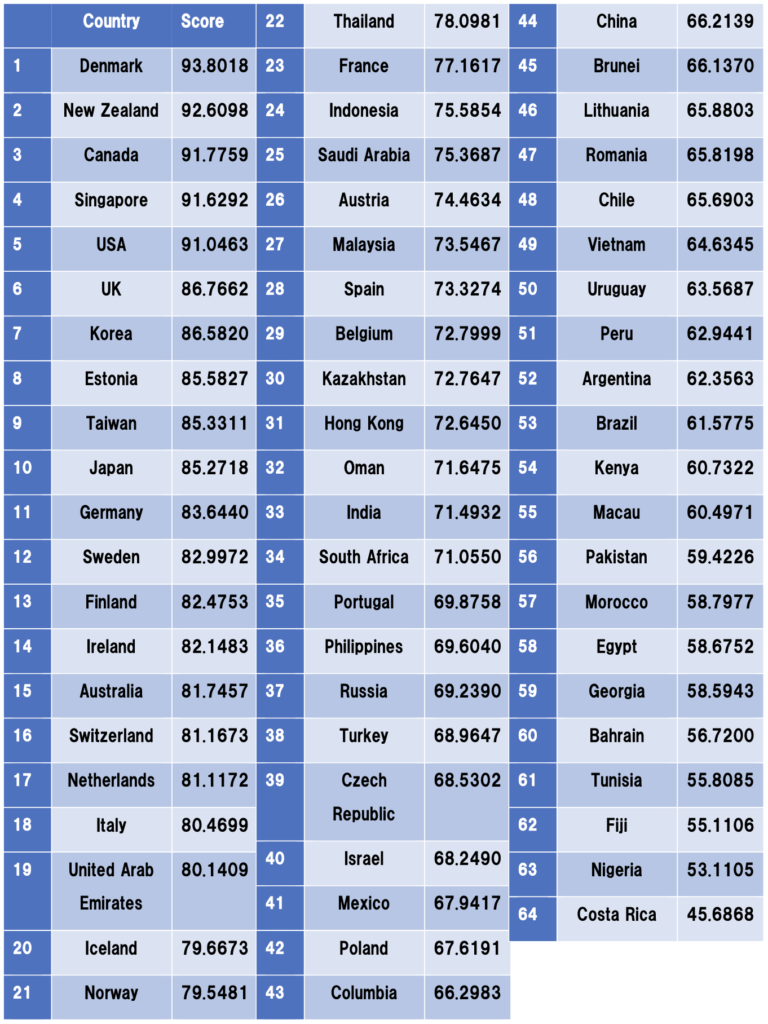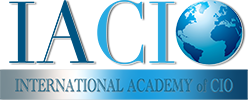17th Waseda University – International Academy of CIO World Digital Government Ranking 2022 Survey Results Announced
Download the 2022 Waseda IAC Digital Government Rankings Report (PDF)
The Waseda-IAC 17th Annual Rankings of World Digital Government Survey evaluated by the Institute of Digital Government, Waseda University established by Dr. Toshio Obi, has released the results of 2022 ranking survey as the 17th consecutive years. The evaluation has been conducted in cooperation with excellent experts of major member universities in International Academy of CIO (IAC).
The 2022 Ranking Survey with 10 Indicators marks Denmark at first place as the same last year, followed by New Zealand in 2nd post. the Canada ranks in 3rd, Singapore in 4th, USA in 5th, UK in 6th, South Korea in 7th, Estonia in 8th, Taiwan in 9th, and Japan ranks 10th in the top group.
As a matter of fact, most governments above mentioned have increased their excellent achievements in both citizen-centric approach / demand-pull online one stop services with “No one left behind” as SDGs slogan and digital technologies such as AI,5G and Blockchain.
This report provides various information and data on both Digital Innovation and Digital Economy as well. These become the key to economic growth and challenges in line with the objectives of Digital Government, which indicates warning signal against digital divide and innovation gap. It might be significant trend that many governments have worked on an early warning system against increasing cybersecurity attacks as well.
In the middle of the overall ranking, there are many countries which increased or decreased their ranks compared to the ranking in a few years due to competitive edge. Ten main indicators below evaluate the process and achievement of Digital Government ranking in 2022. The 2022 rankings are summarized based on the fruitful results by a harmonized combination of many stakeholders during every year survey, and the team prepares the relevant reports with precious lessons from various international and regional conferences and meetings with international institutions such as APEC, ITU, and OECD as well as receiving the productive comments from experts of IAC member universities, government, and business groups.
The 2022 rankings also point to significant trends in the usage of digital technologies in government activities. The report shows that there are vital new trends, and they will continue to grow strongly in the coming years.
On this regard, an analysis for 17 years of the Waseda – IAC Digital Government Rankings Survey 2022 indicates the following 13 highlights of the new trends, these are:
DX Challenges for Digital Government
DX and Regulation Reform
COVID-19 measures
Human resources – Hybrid work
Digital Inclusion
Data Driven Evaluation System
Resilient Smart City
Digital Literacy
Silver Innovation
Cybersecurity
DigitalTwin
AI for Digital Government
Prospect for 5G and Beyond 5G (6G)
However, although there are lots of fluctuations in the usage of AI and other technologies, many governments in developing countries have not yet made much progress on the activities of the digital government due to COVID-19. A few countries have adopted both AI and IoT to improve the quality of service and productivity of work, most of which are concentrated in developed countries such as Denmark, top of the ranking 2022. Frankly speaking, the reality is that business sectors have speedy advanced in usage of technology and ICT manpower in comparison with government and public sector. Therefore, any government must catch up with them, to avoid the digital gap between public and business sectors.
In addition to the above topics of the highlights, there will be six global socio-economic challenges for Digital Government to be solved. These are:
“Digital Innovation with Standardization-Cloud computing, IoT and AI applications”,
“Ageing Society with skyrocketing population ageing”,
“Limited usage of Open Innovation”,
“Digital Divide in global and local communities”,
“Urbanization issues with rapid-rise of Mega city and unbalanced harmonization of urban and rural communities” and
“Lack of Cooperation between Central and Local governments”.
As for the UN’s SDGs, the useful utilization of Digital Government might be one of major objectives for stakeholders. On this regard, Digital Government could support the smooth digital transformation (DX) needed for each SDGs sector.
This survey is well conducted and edited by Prof. Naoko Iwasaki assisted by Dr. Nguyen Hien of Waseda University with energetic effort under the guidance of Prof. Toshio Obi and the distinguished experts from Waseda University and 9 world-class universities under the umbrella of the International Academy of CIO in the field. These Institutions as well as experts are: Peking University (China, Prof.Yang), George Mason University (USA, Prof.Auffret), Thammasat University (Thailand, Prof.Sunkpho), Bandung Institute of Technology (Indonesia, Prof.Suhono), RANEPA (Russia, Prof.Ryzhov), University of Turku (Finland, Prof.Dahlberg), Bocconi University (Italy, Prof.Buccoliero), Taiwan e-Governance Research Center (Taiwan, Prof.Liao) and De La Salle University (Philippines, Prof.Magno). Thanks for their precious contributions to the multi-stages of the evaluation and analysis. Also, Appreciations for many professors and research staffs of Waseda University Institute of Digital Government, Tokyo for engagement in 17 years.
Finally, the team hopes that this report will be able to contribute excellent values globally to all parties concerned. We recognize now that the mankind has unfortunately suffered from the serious COVID-19 pandemic all over the world for almost 3 years, and we are sure that Digital Government can offer effective solutions on well-being/healthy quality of life over corona, post-corona and pandemic issues. It is well noted that this edition is extremely significant in the process of promoting SDGs as well. In addition, we are convinced that the contents of 17th annual ranking report 2022 are well associated with both digital transformation (DX) and innovation.



